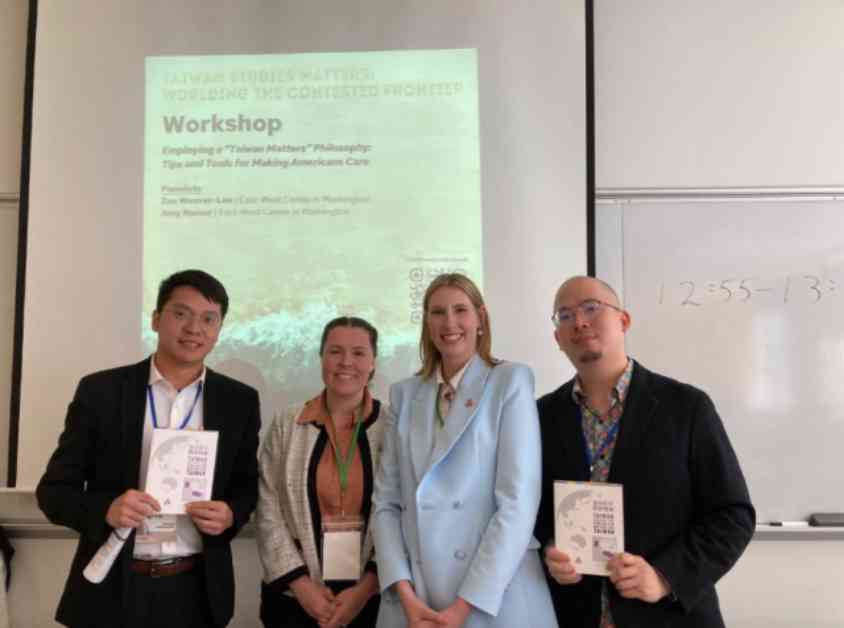Exploring the Significance of Taiwan
The North American Taiwan Studies Association’s (NATSA) 2024 Conference recently held a workshop titled “Employing a ‘Taiwan Matters’ Philosophy: Tips and Tools for Making Americans Care,” featuring Amy Namur and Zoe Weaver-Lee from the East-West Center in Washington (EWCW). The session, co-moderated by Dah-Wei (David) Yih (University of Virginia School of Law) and Chris Chih-Hua Tseng (Department of Sociology, University of California, Irvine), aimed to energize participants to communicate Taiwan’s importance more effectively to American audiences.
The NATSA celebrated its 30th anniversary by hosting a variety of workshops, events, and paper panels, bringing together nearly 150 participants in upper Manhattan. The theme of the 2024 Annual Conference, “Taiwan Studies Matters: Worlding the Contested Frontier,” focused on bridging Taiwan’s local knowledge with global perspectives. Participants at the conference shared insights on their “Taiwan experience” and engaged in discussions on how to tell a compelling Taiwan story to their American friends.
Why Taiwan Matters
The workshop highlighted the critical question of why Taiwan matters, a topic that has sparked debates across academia and various fields. Taiwan’s status as a leading democracy, advanced economy, and technological powerhouse underscores its importance on the global stage. From an American perspective, Taiwan’s significance spans economic, geopolitical, and ideological dimensions, with the US government recognizing it as a key partner in the Indo-Pacific region.
Articulating the importance of Taiwan can be challenging, especially in convincing Americans to care about the island nation. The workshop emphasized the need to understand the links and stakes involved in Taiwan-US relations, showcasing the shared values, economic ties, and strategic significance between the two countries. Participants discussed Taiwan’s role in the global technology supply chain, particularly in semiconductor manufacturing, stressing its implications for global industries and the US economy.
In addition to political and economic aspects, the workshop highlighted Taiwan-US collaborations in scientific and educational fields. The facilitators pointed out that Taiwan is a significant source of international students for the United States and highlighted educational exchanges that strengthen ties between the two countries. The discussions underscored the multifaceted relationship between the US and Taiwan beyond political and economic realms, showcasing the depth of their engagement in various sectors.
Building Connections Through Engagement
To deepen participants’ understanding of Taiwan’s contributions to the United States, the workshop featured interactive activities like “Taiwan Matters Trivia” and a “Subnational Simulation.” These activities aimed to engage participants in actively exploring and sharing knowledge about Taiwan-US relations at different levels, from subnational to individual engagement.
The engaging activities encouraged participants to integrate Taiwan into their everyday conversations and explore creative strategies for effective communication. By involving Americans in the Taiwan discourse and promoting knowledge about the island nation, participants could bridge connections and foster international understanding. The workshop emphasized the role of individuals in promoting awareness of Taiwan’s significance and dispelling misconceptions through personal engagement and storytelling.
As NATSA 30 highlighted the strength of Taiwan’s democracy in the face of authoritarian aggression, the workshop provided participants with valuable tools and tactics to enhance appreciation of Taiwan’s role in the international community. By sharing the story of Taiwan with people across the United States, participants could contribute to strengthening ties and fostering mutual understanding between the two nations.
In conclusion, the workshop at the NATSA 2024 Conference served as a platform for participants to explore the significance of Taiwan, engage in meaningful discussions, and equip themselves with the tools to effectively communicate Taiwan’s importance to American audiences. By highlighting the shared values, economic ties, and strategic importance between the US and Taiwan, the workshop underscored the multifaceted relationship between the two nations and encouraged participants to play an active role in promoting knowledge and understanding of Taiwan in the United States.












